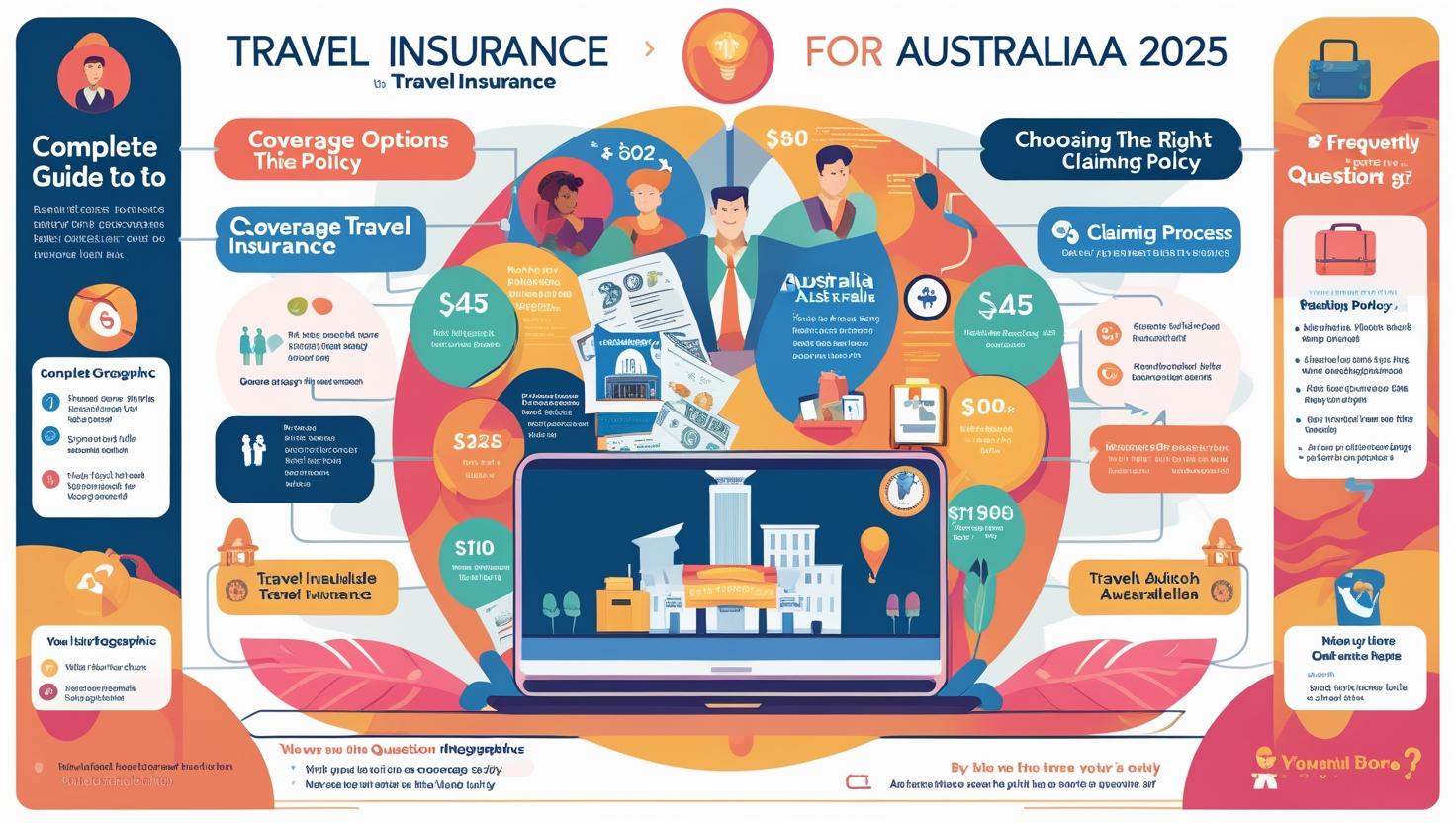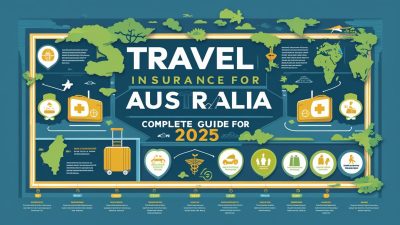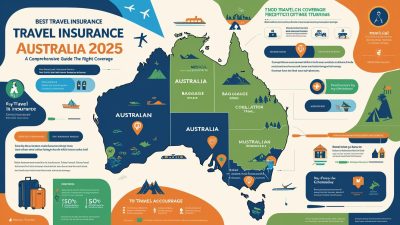Backpacker Travel Insurance in Australia: Your Ultimate Guide for 2025
Bloggerbanyumas.com – For Australians planning extended trips abroad or venturing off the beaten path, backpacking is a popular way to explore the world. Whether you’re planning to hike the mountains of New Zealand, trek through Southeast Asia, or backpack across Europe, ensuring you have the right travel insurance is essential. Backpacking comes with its own set of risks, including medical emergencies, lost baggage, and trip interruptions, which is why choosing the right backpacker travel insurance in Australia is crucial to protect yourself while you’re on the go.

Backpacker travel insurance policies are designed to offer coverage that aligns with the specific needs of long-term travelers, often covering multiple countries, a variety of activities, and more comprehensive health care options. In 2025, as more Australians embrace extended travel, the availability and flexibility of backpacker travel insurance have expanded. However, with so many providers and policy options available, it can be overwhelming to figure out which one best suits your unique travel plans.
This guide provides everything you need to know about backpacker travel insurance in Australia. From understanding the key coverage areas to knowing what to look for when choosing the right policy, we’ll ensure you’re prepared to hit the road with peace of mind. By the end of this article, you’ll have a clear understanding of how to secure the best travel insurance for your backpacking adventures.
The Importance of Backpacker Travel Insurance in Australia
Backpacking is more than just a way of traveling; it’s an adventure, and it requires a different level of preparation than a standard holiday. While backpacking allows for flexibility and freedom, it also brings about a variety of risks that need to be addressed through comprehensive travel insurance. Having the right travel insurance ensures that, should something go wrong, you won’t face financial hardship or be left stranded with no access to medical care or assistance.
Unlike typical vacation insurance, backpacker travel insurance policies are tailored to cover long-term travel, including the risks associated with working abroad, multiple destinations, and a wide range of activities that many backpackers engage in, such as hiking, scuba diving, and volunteering. The right policy will safeguard your health, belongings, and plans, ensuring that even the unexpected can be handled efficiently.
The Australian travel insurance market in 2025 is full of options for backpackers, from policies that offer unlimited medical cover to those designed for specific activities or destinations. By thoroughly comparing the offerings, you can find a policy that not only meets your travel needs but also fits your budget.
What to Look for in a Backpacker Travel Insurance Policy
When choosing a backpacker travel insurance policy in Australia, there are several key factors to consider. These factors ensure that you’re not only covered for general travel risks but also for the unique situations that often arise during long-term or multi-destination trips. Here’s what you need to know before purchasing a policy.
1. Medical Coverage for Backpackers
The most important feature of any backpacker travel insurance policy is medical coverage. Long-term travelers are more likely to face medical emergencies or illnesses while abroad, and access to quality healthcare can vary greatly by destination. Medical coverage should include the following:
- Emergency Medical Expenses: Coverage for medical treatment, hospitalization, and doctor visits in case of illness or injury.
- Emergency Evacuation: If you’re in a location with limited medical facilities, emergency evacuation to a medical center or even repatriation to Australia may be necessary.
- Pre-existing Conditions: If you have pre-existing medical conditions, look for policies that specifically cover these conditions. Some insurers may require additional premiums or exclusions, so it’s important to disclose this information upfront.
- Mental Health: Many backpackers face stress, anxiety, or mental health challenges during their travels. Look for a policy that includes mental health coverage if this is a concern.
2. Trip Cancellation and Interruption Coverage
Even the best-laid plans can go awry. A backpacking trip could be interrupted by unforeseen events, such as illness, a family emergency, or natural disasters. Backpacker travel insurance should offer trip cancellation and interruption coverage to protect you from financial losses incurred when you need to cut your trip short or cancel it altogether.
- Trip Cancellation: If your trip is canceled before departure due to a covered reason (e.g., personal injury, serious illness), trip cancellation coverage will reimburse you for non-refundable expenses.
- Trip Interruption: If you need to interrupt your trip after you’ve started, for example, due to illness or family emergencies, this coverage will help cover your additional costs, such as the return flight home or hotel accommodations.
3. Lost, Stolen, or Damaged Baggage and Personal Belongings
Backpacking often involves carrying valuables like electronics, cameras, and travel gear. Losing or damaging your belongings during your travels can be a costly experience. A good backpacker travel insurance policy will cover the loss, theft, or damage of personal items, including your backpack, electronics, or even important documents like your passport.
- Baggage Coverage: Includes reimbursement for lost or stolen luggage, as well as necessary expenses such as buying replacement clothes.
- Valuables and Electronics Coverage: Look for a policy that includes coverage for valuable items such as smartphones, cameras, and laptops. Some insurers offer higher limits for these types of items.
- Delayed Baggage: If your luggage is delayed, some policies will cover the cost of essential items like clothes and toiletries until your baggage is returned.
4. Adventure Activities Coverage
Backpackers often engage in a variety of adventurous activities, such as hiking, surfing, scuba diving, or mountain climbing. Many standard travel insurance policies exclude coverage for these activities, or they charge higher premiums. When comparing backpacker travel insurance policies, ensure that the activities you plan on doing are covered, or that you can add extra coverage for certain high-risk activities.
- Sports and Activities: Be sure to check whether activities such as bungee jumping, trekking, or skiing are included in your policy. Some insurers allow you to purchase additional coverage to cover specific activities.
- Adventure Sports Add-Ons: If you plan on engaging in activities like scuba diving or skydiving, it’s important to check if these are covered under a general policy or if you need a special add-on to be covered.
5. Coverage for Working Holiday Travelers
If you plan on working while traveling, especially in countries like New Zealand, the UK, or Canada, some backpackers’ insurance policies also include coverage for working holidays. This can cover injuries or accidents that occur while working abroad, as well as offer assistance with legal or employment-related issues.
Look for policies that cover working holidays and include the following benefits:
- Accident or Injury Coverage: Covers injuries sustained while working, including medical treatment or recovery costs.
- Liability Coverage: In case you cause damage or harm to someone while working, this type of coverage will protect you from legal costs.
6. COVID-19 Coverage
Although the global situation has evolved, some countries still require travelers to show proof of COVID-19-related coverage, especially for emergency medical expenses or trip cancellations due to COVID-19 restrictions. In 2025, many travel insurers include COVID-19 coverage as part of their backpacker policies, covering medical treatment for the virus and trip interruptions due to travel bans or quarantine requirements.
When purchasing a policy, make sure to confirm that COVID-19 is explicitly covered, especially if your destination has specific entry requirements related to the pandemic.
7. Emergency Assistance and 24/7 Support
Being in a foreign country can be intimidating, especially if you find yourself in a medical emergency. A reliable backpacker travel insurance policy should offer access to 24/7 emergency assistance. Many insurers provide a helpline that can assist with everything from finding local doctors to arranging medical evacuation.
The availability of reliable, immediate support is essential when you’re in an unfamiliar country and may not know where to turn for help.
Comparing Backpacker Travel Insurance Policies in Australia
With so many options available for backpacker travel insurance in Australia, it’s important to compare policies carefully. Here are some strategies to help you find the best deal that suits your needs:
1. Use Comparison Websites
Websites like Compare the Market, iSelect, and Canstar allow you to compare travel insurance quotes from multiple providers in one place. These platforms let you enter details about your trip, activities, and pre-existing conditions to get quotes tailored to your specific needs.
2. Review the Fine Print
Once you have a list of potential policies, take time to read the fine print. Pay close attention to exclusions, coverage limits, and any clauses related to your pre-existing conditions or adventure activities. Not all policies are the same, and understanding the details ensures you’re not caught off guard when you need to file a claim.
3. Consider Your Destination and Activities
The type of coverage you need may vary depending on your destination and planned activities. If you’re heading to countries with higher medical costs, such as the US or certain European countries, ensure your policy provides adequate coverage. If you’re planning adventurous activities like scuba diving or skiing, make sure the policy covers these activities, or look for an add-on option.
4. Get a Quote Based on Your Health
If you have pre-existing medical conditions, be sure to declare them when getting quotes. Some insurers may offer coverage for certain conditions at an additional premium, while others may exclude them altogether. Ensure that your insurance covers medical emergencies related to any health issues you have and that the coverage is adequate for your specific needs.
5. Check the Claims Process
The ease of the claims process is an important consideration when purchasing travel insurance. Check for insurers that offer an efficient and straightforward claims process, especially for emergencies that can occur while backpacking. Reviews from other travelers can be helpful in determining how well an insurer handles claims.
Conclusion
When planning a backpacking trip, travel insurance is a vital component to ensure that you’re protected throughout your journey. Backpacker travel insurance in Australia offers essential coverage for medical emergencies, lost baggage, trip cancellations, and the adventure activities that backpackers often enjoy. By carefully comparing policies, reviewing coverage options, and considering your personal needs and travel plans, you can secure the right insurance for your trip.
In 2025, with a wide range of travel insurance providers offering specialized backpacker coverage, it’s easier than ever to find a policy that provides both comprehensive protection and peace of mind. Use comparison tools, fully disclose your medical history, and ensure you’re getting the best value for your needs. With the right travel insurance in place, you can embark on your backpacking adventure knowing you’re covered in case of the unexpected.












